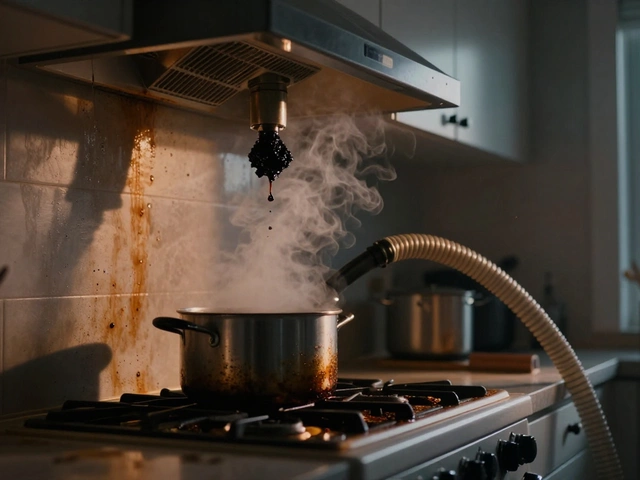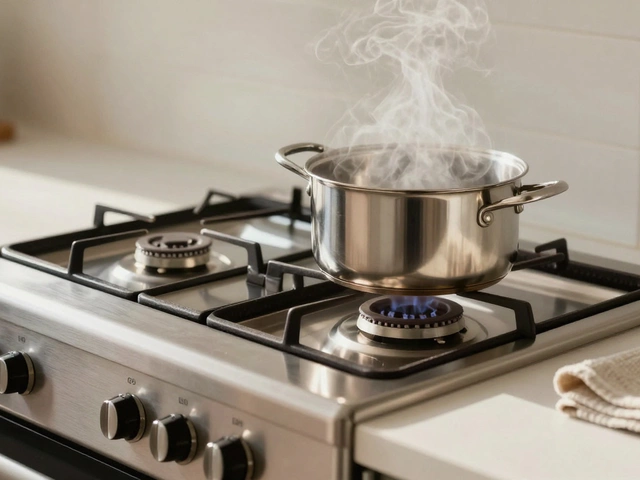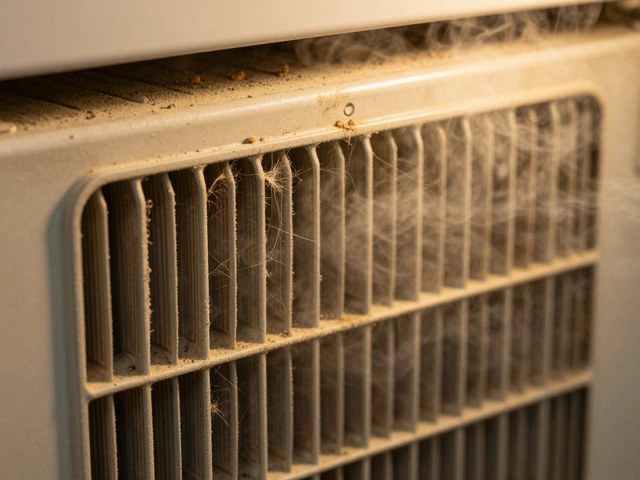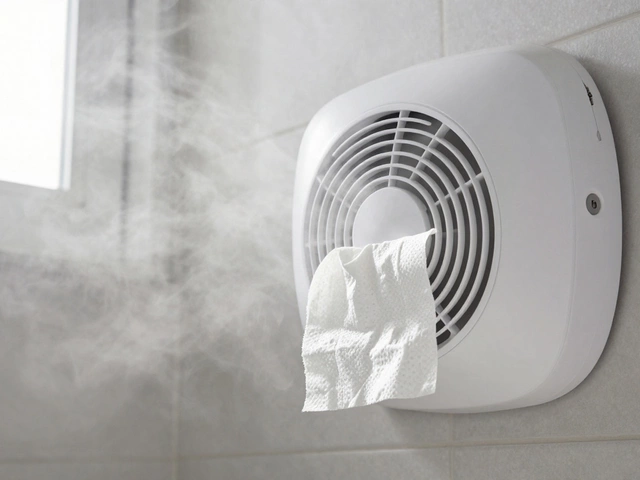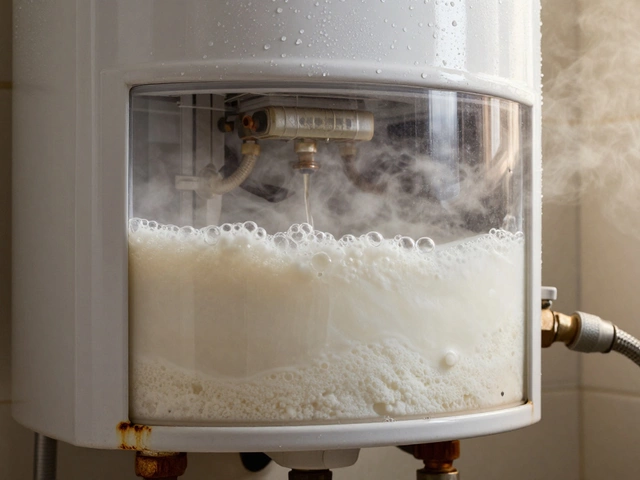When your morning shower turns icy cold, it's not just inconvenient—it's a signal that your hot water heater might be in need of some TLC. Determining whether to repair or replace your heater depends on several factors, including its age, efficiency, and the extent of the problem.
In many homes, the hot water heater is often an unsung hero, dutifully performing its job until something goes awry. Before you rush into a decision, it's worth understanding the signs of trouble and the potential costs involved.
By doing a bit of homework, you can weigh the benefits of repair versus replacement, ensuring you make a choice that keeps both your wallet and hot showers happy. With the right knowledge, you'll be ready to extend the life of your current heater or welcome a new, more efficient model into your home.
- Signs Your Hot Water Heater Needs Attention
- Evaluating Repair Costs Versus Replacement
- Energy Efficiency Considerations
- DIY Maintenance Tips
- When to Call a Professional
Signs Your Hot Water Heater Needs Attention
Keeping a close eye on your hot water heater is like being a vigilant parent; spotting issues early can prevent a lot of frustration down the line. One major telltale sign is inconsistent temperatures. If your water takes longer than usual to heat or the heat is fleeting, your heater may need repair. Such irregularities often hint at a failing heating element or sediment build-up.
Another red flag is unusual noises emanating from the heater. Rumbles, bangs, or pops typically indicate that sediment has settled at the bottom of the tank. When the burner heats this sediment, it can cause the noises you're hearing. Left unchecked, this accumulation can not only disrupt the heater’s efficiency but also lead to potential damage.
If you notice rusty water coming from your taps, it might not be your plumbing but the heater itself. This could point to corrosion inside the tank, potentially leading to leaks if not addressed. In cases where hot water comes out rusty, especially for those with galvanized piping, it's crucial to determine whether the tank or the pipes are the culprits.
Water pooling around the base of your heater is a more urgent cause for concern. Leaks can stem from various parts of the heater, such as the tank or its components, and pose a risk of substantial damage if ignored. Drips or leaks should be examined promptly to avoid more extensive—and expensive—repairs.
The heater's age is another factor to consider. Water heaters generally last about 8 to 12 years. If your heater is within this age bracket and frequently needs repairs, it might be time to consider a replacement. An aging heater means a higher risk of breakdowns, inefficiency, and energy wastage. Regular maintenance can help extend its useful life, but when repairs become too frequent, a new unit might be the smarter investment.
In some cases, you might notice a sudden spike in energy bills. This isn’t just mere coincidence; it often correlates with your water heater working harder than usual to maintain water temperatures. Faulty thermostats or heating elements frequently cause such inefficiencies, driving energy usage up.
"Don't ignore strange clinks or changes in performance," advises home improvement expert Mike Holmes. "They are your heater’s way of telling you it needs attention."
Neglecting these signs can lead to more significant issues, potentially including a full failure of the system. Regular checks and being alert to these symptoms can not only save you money but ensure you aren't left without hot water when you need it most.
Evaluating Repair Costs Versus Replacement
Deciding between repairing a waning hot water heater and opting for a replacement isn't always straightforward. As you weigh your choices, costs play a pivotal role. The average repair bill for a conventional water heater ranges between $200 to $500 depending on the severity of the issue and your locale, making repairs seem appealing at first glance. Yet, it's crucial to dive deeper into what these repairs entail. Sometimes, these fixes might be nothing more than temporary patches, especially if your unit is around the threshold of its typical lifespan, which hovers between 8 to 12 years.
When facing hefty repair costs, it's wise to consider the efficiency aspect. Older units usually consume more energy due to wear and tear, which could mean your energy bills skyrocket, negating any short-term savings from the repair. On the other hand, investing in a new water heater, particularly an energy-efficient model, might require an upfront cost ranging from $1000 to $3000. While this seems daunting, it’s an investment towards lowering utility bills and gaining reliable hot water access, sometimes giving a 10 to 15-year breather from major issues. This choice might be backed up by expert advice like the tips from the U.S. Department of Energy, which highlight how modern heaters can cut heating costs by up to 50%.
As an HVAC professional once stated, "Replacing your old heater with an efficient model isn’t just about cutting costs—it’s about investing in peace of mind."
When addressing whether to repair or replace, factor in not only your budget but future plans. Are you planning to sell your home soon? A new water heater can be an attractive feature for potential buyers. Or perhaps you're staying put and would prefer the least hassle over the coming years? Then a long-term investment makes sense. Don't forget age is a significant factor; if your unit is nearing a decade old, even minor repairs might not hold for more than a couple of years.
An interesting statistic shows that about 27% of Canadian homes in 2023 faced decisions like this, with nearly half opting for full replacements over interim repairs. Tables such as these illustrate consumer trends and can provide personal solace in knowing others have tread this path. Ultimately, your decision should align with your financial situation, energy consumption goals, and readiness for modern technology.

Energy Efficiency Considerations
When it comes to deciding whether to repair or replace your hot water heater, energy efficiency is a critical factor that many homeowners may not initially consider but should never overlook. Modern heaters are leagues ahead of their older counterparts in terms of energy consumption, offering substantial savings on utility bills over their lifespan. Assessing the energy efficiency of your current heater involves understanding its Energy Factor (EF), a metric that measures how efficiently the heater converts energy into heat. Newer models feature higher EF ratings, translating into less energy waste and cost savings.
Replacing an older model with a new, energy-efficient unit can reduce your water heating costs by 14-18%, and this difference in bills can quickly offset the initial replacement cost. Look for heaters with the ENERGY STAR label, which indicates compliance with strict energy efficiency guidelines set by the EPA. The upfront investment in such units might be higher, but the decrease in monthly costs often makes it worthwhile. Moreover, some regions offer rebates for water heater repair improvements, which can further alleviate costs.
According to the U.S. Department of Energy, "Water heating accounts for about 18% of your home's energy use." Opting for an efficient heater not only benefits the environment but also supports a more sustainable household operation.
Consideration should also be given to the type of water heater best suited to your energy needs. Tankless systems, for instance, heat water on demand and can be far more efficient for smaller households where demand may not be continuous. Yet, if you have a larger family, a high-efficiency tank water heater might meet your needs more effectively, offering hot water stored and readily available. Investing in a heater with advanced technology, such as heat pump or solar water heaters, could further enhance energy savings and reduce the carbon footprint of your home.
Focusing on maintenance can also significantly contribute to the device's efficiency. Simple acts like draining the tank to remove sediment buildup, insulating pipes, and setting the thermostat to the optimal 120 degrees Fahrenheit can maintain efficiency levels. Such actions not only prolong the life of the heater but also ensure it operates optimally, cutting energy waste. Regular checks and timely hot water maintenance can be pivotal in preventing issues that might otherwise lead to energy inefficiencies.
It's also prudent to evaluate your specific household's hot water usage as this impacts the cost-effectiveness of different options. A detailed assessment of your daily pattern helps select the right capacity and type of water heater, ensuring minimal waste of resources. Additionally, consulting a professional can yield valuable insights into the best fit for your home, considering factors ranging from geographical location and climate to personal consumption habits.
DIY Maintenance Tips
Regular maintenance of your hot water heater is key to preventing unexpected breakdowns and ensuring efficient operation. Taking the time to perform some basic upkeep can significantly prolong the life of your appliance, keeping that comforting stream of hot water flowing when you need it most. First, it's crucial to know that one of the primary causes of water heater failure is sediment build-up. These minerals settle at the bottom of the tank, reducing the efficiency of the heating process and potentially causing damage over time.
Flushing your hot water heater every six months can help eliminate this sediment. To do this, start by turning off the power supply, whether it's electric or gas. Then, attach a garden hose to the drain valve, typically located at the bottom of the tank, and direct it to a suitable drainage location. Turn the valve to allow water to flow out until it runs clear, which means the sediments have been flushed out. Don't forget to close the valve and remove the hose before turning the power back on. Safety first—avoid direct contact with the water, as it can be scalding hot.
Water heater repair often encompasses addressing small leaks that may develop over time. Regularly inspecting your tank for moisture around the base will alert you to potential problems before they escalate. Tightening loose fittings around the pipes can sometimes resolve these issues. If a gasket or valve is the culprit, these parts are generally inexpensive and can be replaced with a bit of patience and the right tools.
Temperature settings also influence the performance and longevity of your hot water heater. Aim for a setting of around 120 degrees Fahrenheit. This temperature provides an optimal balance between hot showers and energy efficiency without placing unnecessary stress on the heater. Lowering the temperature can also mitigate the risk of scalding and reduce your energy bills significantly over time. If you've never adjusted your water heater's temperature, consult the manufacturer's instructions for guidance.
Another crucial, yet often overlooked, component to check is the anode rod. This rod attracts particles that would otherwise corrode the tank. Over time, it disintegrates and should be replaced when more than six inches of its core steel wire is exposed. "The anode rod is the unsung hero of tank-style hot water maintenance," notes an article from Popular Mechanics. Keeping it in good condition can offer your heater a longer life span.
- Flushing the tank every six months
- Inspecting for leaks around the tank
- Adjusting the temperature settings
- Replacing the anode rod as needed

When to Call a Professional
Knowing when to enlist the expertise of a professional plumber for your water heater repair can save you time, money, and perhaps a few cold showers. While some homeowners might be tempted to tackle hot water heater issues themselves, there are clear signs when a professional touch is necessary. If you notice strange noises coming from the unit, such as rumbling or popping, it may signal a buildup of sediment in the tank. This is not just inconvenient but can also decrease the efficiency of your heater and increase your energy bills. Attempting to flush out the tank on your own can be messy and complicated, making it a perfect job for someone with experience.
Another sign that professional help is warranted is water discoloration. If you are suddenly drawing rusty water from the faucet, corrosion might have taken hold inside the tank. Corrosion issues can often be indicative of a larger failure to come, and an expert can provide insight on the severity of the problem and whether a repair or full system replacement is advised. A skilled plumber can also check the anode rod, which plays a crucial role in preventing rust, and replace it if necessary.
Beyond these signs, consider calling a professional if you find yourself frequently adjusting the thermostat in a bid to maintain the right temperature. Fluctuating water temperatures can often be traced back to a faulty thermostat or heating element, components best handled by someone familiar with their intricacies. A professional can not only diagnose the exact issue but also ensure that any replacements or repairs are performed safely and effectively.
"In many cases, a simple service call can extend the life of your water heater," notes Brian Smith, a seasoned expert from the National Plumbing Association. "Regular maintenance and prompt attention to problems can prevent the need for a costly replacement."
Moreover, issues such as visible leaks around the base of your heater require immediate attention from a professional. Leaks can stem from a variety of sources, from loose connections to a deteriorated tank, and identifying the exact cause is crucial to preventing extensive water damage in your home. A professional will have the tools and know-how to not only fix a leak but also test for other potential problems in your plumbing system.
Lastly, every hot water heater has a lifespan, typically between 8 to 12 years. If yours is nearing or surpassing this age, it may be prudent to consult with a professional about preemptive replacement options that could save you from sudden breakdowns. Replacing an old, inefficient model with a new energy-saving unit can provide significant savings on your utility bills. Opting for a professional installation will ensure compliance with local safety codes and regulations, giving you peace of mind.

